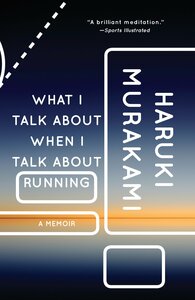Take a photo of a barcode or cover
medium-paced
informative
lighthearted
reflective
slow-paced
inspiring
reflective
relaxing
slow-paced
A very simple, but very beautiful and meditative look at running.
Over time, I have grown extremely tired of Murakami's works. He was too repetitive and, in places, just too damn nasty and overly sexual for my tastes. This book (What I Talk About When I Talk About Running) brought back my respect for the author. I couldn't put the damn book down before I was finished. Murakami's memoirs are refreshing and inspiring, and it made me like him again.
A perfect entry point for Murakami’s work I feel. Reading his personal running journal really helps understand what type of writer and person he is and what sort of life he has lived as well as his motivations and writing style.
Such an insightful and thought provoking memoir which even if I wasn’t a runner I would find relatable in the sense that everybody needs their own form of meditation.
Murakami really captures the essence of running and why it is so widely loved for its physical but more notably mental health benefits. Running really is like meditation for me, it relieves so much stress, clears my head and gives an immediate sense of personal accomplishment through self improvement.
This was the perfect book to read to kick off the new year and maintain my running resolution.
Heck, I’m even planning on signing up to the Athens marathon to be my first ever one as a result of this book!
Such an insightful and thought provoking memoir which even if I wasn’t a runner I would find relatable in the sense that everybody needs their own form of meditation.
Murakami really captures the essence of running and why it is so widely loved for its physical but more notably mental health benefits. Running really is like meditation for me, it relieves so much stress, clears my head and gives an immediate sense of personal accomplishment through self improvement.
This was the perfect book to read to kick off the new year and maintain my running resolution.
Heck, I’m even planning on signing up to the Athens marathon to be my first ever one as a result of this book!
reflective
medium-paced
“The thoughts that occur to me while I'm running are like clouds in the sky. Clouds of all different sizes. They come and they go, while the sky remains the same sky as always. The clouds are mere guests in the sky that pass away and vanish, leaving behind the sky. The sky both exists and doesn't exist. It has substance and at the same time doesn't. And we merely accept that vast expanse and drink it in.” (p.17)
I think the best word to describe my experience reading this would be underwhelming. Murakami has long been one of my favourite writers, so when I found out that we shared a passion for running and he wrote a memoir of sorts following his running journey, I was excited to read all about it. Instead, I felt like I was confronted with an incredibly toxic and dated attitude towards running and runners (I’m 99% certain that Murakami would consider me a non-runner because I don’t run 5:00/km and breathe heavier). He also really loves to objectify female runners; it turns out that his portrayal of women wasn’t a genius move getting into the minds of his dislikable male main characters. He is the dislikable male main character.
Whilst it was interesting reading his marathon and triathlon training/racing experience, I got an essence of what it means when people say “never meet your heroes”—I’d love to be proven wrong but, to me Murakami is just obnoxious and sexist. I tried to separate the art from the artist but unfortunately, since this is a memoir, my negative thoughts and feelings towards Murakami really affected my reading experience.
Moderate: Sexism
What I Talk About When I Talk About Running is perhaps Haruki Murakami's most personal work (I think he says so himself). Being a runner (as well as a writer) concerns his very being or essence, and he tries to explain to the reader what running (as well as writing) means to him.
I was intrigued by the book ever since I've first heard about it. On first glance, running is not the most substantial activity. You put on appropriate clothes, you go outside, and you put one foot in front of the other at the appropriate pace and for an appropriate time. How would this fill a full-length book?
Murakami posed himself the same question. He admits that he struggled to make up his mind on what he wanted to write about. In the end, it had to be as much about himself as about running (something he wasn't initially comfortable with). Actually, he even agrees that the act itself isn't really about anything at all. People often ask what he thinks about while running. Murakami then tells them that, apart from trivialities like the weather, for the most part he thinks about nothing.
Murakami addresses the idea (or cliché) that writers are prone to cigarettes, alcohol, and languishment. To be honest, this isn't too far from the image I had of Murakami, most likely derived from his prototypical protagonist. Before he became a writer and a runner this wasn't too far from the truth. During the writing of A Wild Sheep Chase he gained weight and smoked about sixty cigarettes a day. Now that's a proper writer!
Surprisingly, very un-writer-ly, it's the fitness aspect that drives his running ambitions. What fascinates him about long-distance running – and what makes him go out and run for an hour almost every single day – is the desire to continuously improve your own performance. At the time of publication, he had run a marathon each year for over twenty years. Later in life, he added triathlons to his repertoire. Once he even successfully participated in an ultramarathon, running – not walking, as he proudly recounts – the distance of 100km in less than twelve hours.
This is the aspect about the narrative that resonated with me deeply. I'm not a long-distant runner. Well, I'm not an even remotely successful athlete at all. But the idea of setting yourself physical goals and just stick with them. At one point he discusses how he finds the will to go on. To him for the most part it has very little to do with will power at all. It's just what he does. I think this is why I find it "easier" to do sports almost every single day. It's part of the day, and something I too still have a strong desire for.
In the introduction I've said that it's a personal sense, and I enjoyed reading about the details of his life. I was surprised to find that he started running only at the age of thirty-three. More surprising still, before he became a professional writer (and runner) he owned a jazz club for a couple of years. We also learn about the music he listens to while running. Among the artists he mentions are The Rolling Stones, Beck, Gorillaz, and RHCP. During the summer months he lives and trains on Hawaii and spends many months a year in Cambridge. He's passionate about baseball – for reasons I cannot quite fathom it was during a Tokyo Yakult Swallows match that the sudden urge befell him to write a novel (not necessarily to become a writer). The events are only loosely connected, yet it somehow all makes sense within the bigger picture.
At times it's screamingly funny. It's disheartening when Murakami talks about aging and how he isn't able to keep up with the times he used to run and at some points he's disturbed to find that a marathon took him over four hours. The chapters of the book follow an arc towards the New York Marathon and Murakami trains as he hadn't done in years. At one point he's sure he'll finish the chapter (of his life) gloriously. Of course, it all turns out to be a whole disaster. It's clear that he's genuinely bummed, but the way he tells the story is just too charming and funny.
I also loved how he tells us about his very first marathon, the real marathon from Athens to Marathon. Before his arrival the poor guy didn't realize that it would be along a highway with the sun burning relentlessly. Here we have a story of amazing commitment and success. It's an accomplishment and a story that impressed me greatly.
Rating: 5/5
I was intrigued by the book ever since I've first heard about it. On first glance, running is not the most substantial activity. You put on appropriate clothes, you go outside, and you put one foot in front of the other at the appropriate pace and for an appropriate time. How would this fill a full-length book?
Murakami posed himself the same question. He admits that he struggled to make up his mind on what he wanted to write about. In the end, it had to be as much about himself as about running (something he wasn't initially comfortable with). Actually, he even agrees that the act itself isn't really about anything at all. People often ask what he thinks about while running. Murakami then tells them that, apart from trivialities like the weather, for the most part he thinks about nothing.
Murakami addresses the idea (or cliché) that writers are prone to cigarettes, alcohol, and languishment. To be honest, this isn't too far from the image I had of Murakami, most likely derived from his prototypical protagonist. Before he became a writer and a runner this wasn't too far from the truth. During the writing of A Wild Sheep Chase he gained weight and smoked about sixty cigarettes a day. Now that's a proper writer!
Surprisingly, very un-writer-ly, it's the fitness aspect that drives his running ambitions. What fascinates him about long-distance running – and what makes him go out and run for an hour almost every single day – is the desire to continuously improve your own performance. At the time of publication, he had run a marathon each year for over twenty years. Later in life, he added triathlons to his repertoire. Once he even successfully participated in an ultramarathon, running – not walking, as he proudly recounts – the distance of 100km in less than twelve hours.
This is the aspect about the narrative that resonated with me deeply. I'm not a long-distant runner. Well, I'm not an even remotely successful athlete at all. But the idea of setting yourself physical goals and just stick with them. At one point he discusses how he finds the will to go on. To him for the most part it has very little to do with will power at all. It's just what he does. I think this is why I find it "easier" to do sports almost every single day. It's part of the day, and something I too still have a strong desire for.
In the introduction I've said that it's a personal sense, and I enjoyed reading about the details of his life. I was surprised to find that he started running only at the age of thirty-three. More surprising still, before he became a professional writer (and runner) he owned a jazz club for a couple of years. We also learn about the music he listens to while running. Among the artists he mentions are The Rolling Stones, Beck, Gorillaz, and RHCP. During the summer months he lives and trains on Hawaii and spends many months a year in Cambridge. He's passionate about baseball – for reasons I cannot quite fathom it was during a Tokyo Yakult Swallows match that the sudden urge befell him to write a novel (not necessarily to become a writer). The events are only loosely connected, yet it somehow all makes sense within the bigger picture.
At times it's screamingly funny. It's disheartening when Murakami talks about aging and how he isn't able to keep up with the times he used to run and at some points he's disturbed to find that a marathon took him over four hours. The chapters of the book follow an arc towards the New York Marathon and Murakami trains as he hadn't done in years. At one point he's sure he'll finish the chapter (of his life) gloriously. Of course, it all turns out to be a whole disaster. It's clear that he's genuinely bummed, but the way he tells the story is just too charming and funny.
I also loved how he tells us about his very first marathon, the real marathon from Athens to Marathon. Before his arrival the poor guy didn't realize that it would be along a highway with the sun burning relentlessly. Here we have a story of amazing commitment and success. It's an accomplishment and a story that impressed me greatly.
Rating: 5/5
But something else was pushing me on: You practiced as hard as you could in all that heat, didn’t you? If you can’t make this time, then what’s the point? You’re a man, aren’t you? Start acting like one! This voice whispered in my ear, just like the voices of the cunning cat and fox that tempted Pinocchio on his way to school.
Memoir + Inspirational read. I used to enjoy running and this book makes you rethink all the excuses you've made not to run today or now. Very simple read - talks about success, failure, suffering, goals, self-satisfactions and what not. I also enjoyed the philosophical lessons/messages in this book.
Memoir + Inspirational read. I used to enjoy running and this book makes you rethink all the excuses you've made not to run today or now. Very simple read - talks about success, failure, suffering, goals, self-satisfactions and what not. I also enjoyed the philosophical lessons/messages in this book.
adventurous
emotional
hopeful
informative
inspiring
reflective
relaxing
fast-paced





